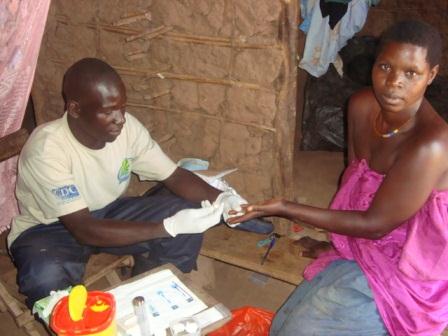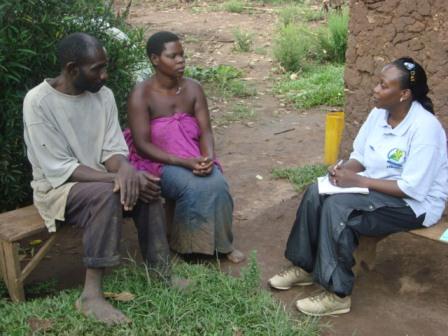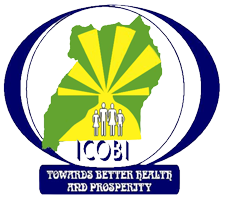Background:
ICOBI received an award from PEPFAR through CDC to implement a project entitled “Provision of Full Access Home-Based (Door-to-Door) Confidential HIV Counseling and testing (HBHCT) and Basic Care in High HIV Prevalence Central districts of the Republic of Uganda in five years. This program which began in July 2008 aims to contribute to the reduction of HIV infection rate and mitigate the impact of HIV in the districts of Mubende, Mityana, Luwero, Nakaseke, Nakasongola and Wakiso.
Goal of the HBHCT project:
To contribute to the reduction of HIV infection rate and mitigate the impact of HIV.
Program Coverage:
Its current coverage includes 6 districts of Mubende, Mityana, Luwero, Nakaseke, Nakasongola, and Wakiso.
Specific Project Objectives:
- To increase level of Comprehensive HIV/AIDS knowledge among community members living in the districts Luwero, Mityana, Mubende, Nakaseke, Nakasongola and Wakiso by the end of June 2013
- To offer Home Based HCT to at least 500,000 people (individuals and couples including the MARPS) in the six districts of Luwero, Mityana, Mubende, Nakaseke, Nakasongola and Wakiso by the end of June 2013.
- To facilitate linkages for HBHCT clients for HIV combination prevention services in Luwero, Mityana, Mubende, Nakaseke, Nakasongola and Wakiso by the end of June 2013
- To provide basic health care, ongoing support and counseling to 13,500 HIV+ individuals by the end of June 2013
- To obtain data for monitoring and evaluation of HBHCT implementation in the project districts
Target Group:
All residents above 14 years of age and children at risk of HIV infection in the districts of Mubende, Mityana, Luwero, Nakaseke, Nakasongola and Wakiso.

HCT in a home

Approach:
The program uses teams each composed of a counselor and laboratory assistant (all trained in HIV counseling and testing according to the International and National standards. The Counseling and Testing teams are supported by community resource persons/volunteers based in each of the parishes(service outlet) called resident parish mobilizers (RPMs) and Village health team(VHTs). Each VHT member is responsible for moblization of residents in about 25-30 households. The RPMs and VHTs mobilize households and communities with the support of local councils(some of the volunteers are members of the local councils) and make appointments before the CT teams visit households.
At home the CT teams offers HIV health education (group, individual, and couple), HIV pretest counseling and consenting for individuals and couples. Blood is drawn and tested for HIV for the cnsenting individuals and couples. A 3-tier HIV test algorithm approved by Ministry of Health,Uganda(MoH) and CDC is used in the home setting. Same day HIVtest results are given to individuals and couples after HIV post test counseling who need them.
HIV positives identified are refered and linked to health units for Pre-ARTassessment and provision of basic care package that include safe water vessels,water guard(chlorine solution) and ITNs as well as CTX prophylaxis. Follow up of clients in homes is supported by VHTs,RPMs,peer educators, Basic care officers,community educators,field counseling and testing teams, health workers,spiritual leaders etc All identified HIV infected pregnant women are refered, linked and followed up for PMTCT services at health facilities. The consenting HIV negative males for SMC services are referred and linked to circumcision events supported by CDC through AMREF and the district health system.
Program Activities:
- Community mobilisation (sensitization meetings, IEC materials and radio talk shows)
- Training and capacity building health workers and VHTs
- Recruitment and deployment of CT teams
- HIV counselling and testing in homes and referral of HIV infected persons to health centres
- Support to health system mainly VHT structure and waste management
- Quality control and assurance system
- Support and link PLHA through referral to H/units and other service providers
- Referral from homes/communities to health units
- Follow up and home visits of clients in homes
- Provision of basic care for HIV infected individuals through collaboration with PACE ,health units and VHTs/peers
- Data Collection and Management
- Support Supervision, Monitoring and Evaluation
Dissemination of lessons learnt and good practices
Partnerships:
Greater collaboration has been established with district health system organised under the district health officer and community development departments at sub county levels as well as other partners including Mild May International, AMREF, PACE, PREFA, Red Cross Uganda, MJAP etc.




